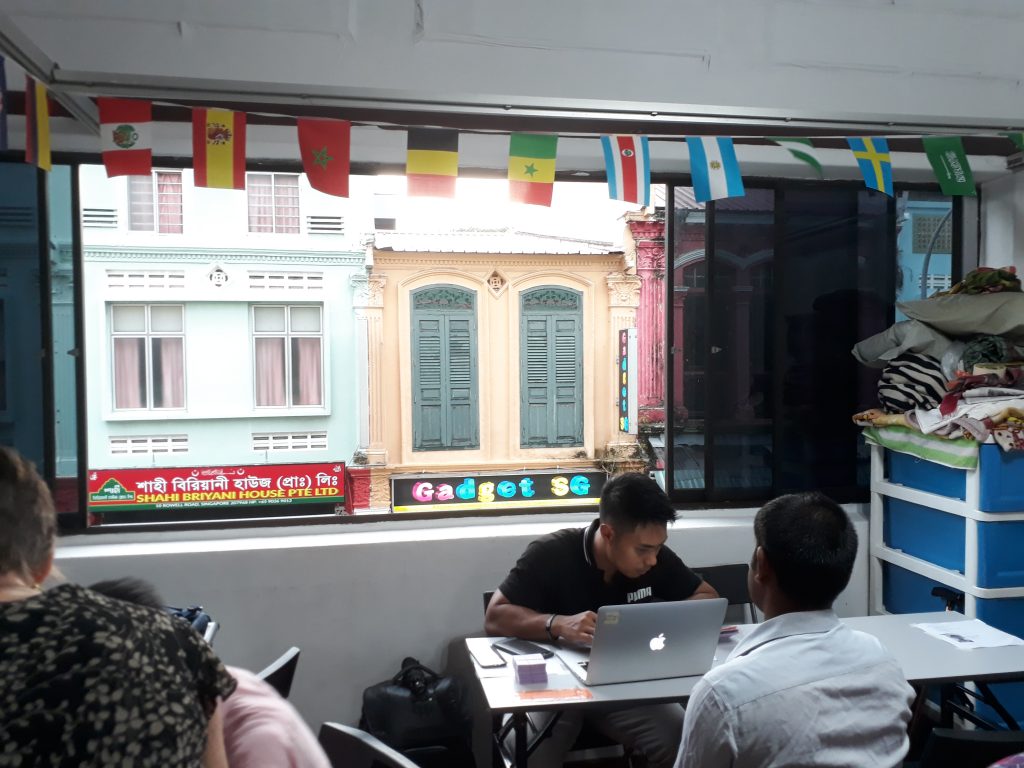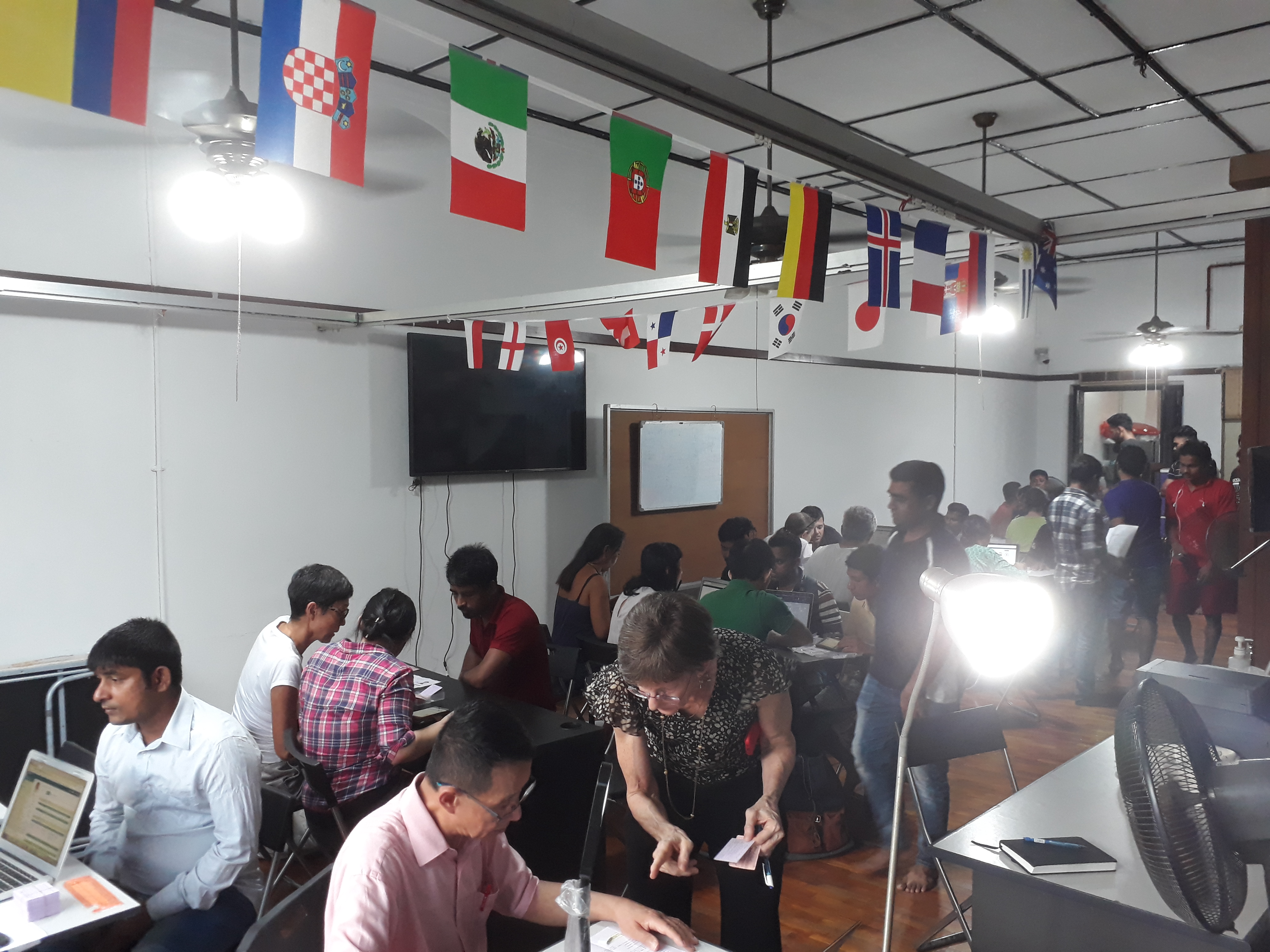Upstairs, the throng gives way to a brightly-lit room, parquet flooring, and breezy fans. A short, loud, pink-shirted man strides back and forth, taking photos and answering questions from more junior volunteers.
The line is organised by volunteers who are familiar with the group’s native tongue; each time a seat is vacated, a shout of “Ekajahn!”—‘one fellow’, in Bengali—goes up, and the seat is swiftly filled.
I’m at one of the meal stations operated by Transient Workers Count Too (TWC2), a local Non-Governmental Organisation (NGO) that supports foreign workers facing difficulties in Singapore.
Some weeks prior, I reached out to TWC2 with a simple question: what was the debt situation like for non-domestic foreign workers—their primary ‘clients’—in Singapore? For answers, I was directed to Alex Au who is the self-described sergeant major of this meal station.
Alex’s answer surprised me.
“The majority of them, I would say, are in an undischarged debt situation.”
By his estimation, 75-80% of TWC2’s clients have outstanding debts, and that number can be extrapolated to the entire foreign worker population in Singapore.
And even that doesn’t quite cover it.

Eight thousand dollars? For a low-paying job? But I digress—
Of course, he didn’t have five lakh lying around. Two were provided by his father; another three lakh ($4,800) were borrowed from Brac Bank in Bangladesh.
As of today, five years after taking that loan, Khabirul has paid the bank over 20,000 SGD. Despite this, he’s still exactly “one-lakh-fifteen”—1,845 SGD—in debt.
That’s right: after paying S$20,000, Khabirul has only discharged $3,000 of his debt. This is because every month, he is charged 300 SGD in interest; a rate of 6.25% per month. Every year, most of his payments to the bank simply fulfil his interest fee, instead of repaying any of his debt.
It gets worse. For many foreign workers, their work permit is up for renewal after one year.
“If he doesn’t get a renewal,” says Alex, “He’s in deep shit. He desperately needs a second job, which means he pays for it, and he hasn’t even discharged the loan for the first job!”
Obviously, this loan situation is illegal. Under Bangladeshi law, borrowers can’t be made to return more than twice the original sum they borrowed, regardless of interest rate. I put this observation to Alex.
“Too many of us,” he sighs, “Go around discussing social and civil problems with the assumption that somehow all countries, and all governments, are equal. They are not.”
“The Bangladeshi government is in no way equal to the Singapore government, in its effectiveness, in its incorruptibility—everything is corrupt in Bangladesh!” he exclaims, making me jump.
When they take a loan from a Bangladeshi bank, workers often have to give the title deed to their land as assurance. Once this happens, their family is at the mercy of the bank. In my mind, this takes the form of spray paint and ‘O$P$’
“It’s a very common complaint,” says Alex, “[That] people would visit the family, and all that. You’re imagining loan sharks, but we’re talking about institutional lenders. The lenders are the establishment!”
Bangladesh’s High Commission in Singapore doesn’t agree. Sheikh Mesbahuddin Ahmed, an administrative officer, responded to our queries, saying:
“No formal bank can ask interest at 6.5% per month … This is only possible in the case of informal borrowing. The government of Bangladesh is trying to reduce the migration cost, streamline the recruitment process, and remove middlemen who are largely responsible for the increased costs.”
“Some workers often exaggerate their owes to get sympathy,” he adds. Brac Bank representatives did not respond to requests for comment.
Alex remembers overseeing the case of a worker who once owned a substantial plot of land in rural Bangladesh. Hoping to earn enough to buy more land, he took out a loan to work in Singapore, but things didn’t go according to plan. Now, his family lives in a shanty hut in Dhaka.
I ask Alex what he can do; what TWC2 can do, for cases like these.
“What can we do, from here? Nothing,” he sighs again.
Do these workers even understand the enormous scale of debt they’re getting themselves into?
“I don’t think they’re stupid,” he replies, “… They probably do realise it’s going to be tough.”
He explains that the very question betrays a “middle class Singaporean mindset: to weigh the pros and cons, maybe reject the job and take another job.”
“For them, there is no option … unemployment is so high, when a job is offered to you, do you have the luxury of thinking through the terms? You will GRAB the job!”
Furthermore, there are cultural motivating factors, as Alex explains:
“In our culture, if your mother is sick, there’s no way you’re going to say ‘I’m not going to pay for her treatment.’ You’ve just got to do your best. So in their culture, if your sister needs to be married, die-die still have to come up with a dowry!”
Similarly, if culture demands that a worker earn money for more land, or simply on the wishes of the family’s patriarch or matriarch, then a job offer must be accepted.
Amongst those doing the offering, there is much profit to be made. For a first time worker, a Bangladeshi EA can charge as much as $15,000 for a job. For a relatively low-wage position, this seems like a ridiculous price.
“For every job,” explains Alex, “There are twenty or thirty other persons … looking for [it]. When you have a ratio that’s so out of whack, one side in the bargain (the worker) is so desperate that the other side (the EA) has all the power, and is able to charge whatever he wants.”
“The reason EAs can charge so much money is because they hoard their contacts. They simply know company A, company, B, company C. They seem to have an exclusive agreement with them!”
Abiwullah, another Bangladeshi worker, paid $10,000 for his job in Singapore, most of it borrowed. He has been working in Singapore for three years.
When I ask him whether he has repaid his debt, he shrugs his shoulders helplessly at me.
“No job, how to pay?”
While Singapore law bars EAs from charging more than two months of a worker’s promised salary, it has no control over EAs in Bangladesh, who restrict access to jobs through these informal ‘agreements’, then charge exorbitant prices.
But how exactly do EAs get exclusive agreements with employers here in Singapore?
Alex has a theory: “They just promised the boss of company A, B, or C that they would share the recruitment fee [with them] … That makes them very exclusive, right?” he jokes, peering impishly at me over his spectacles.
Alex is talking about kickbacks; employers pocketing a sum of the employment fee, earning off the recruitment of their workers. This is illegal, but not unprecedented. As recently as May 2018, a construction firm director was jailed for labour importation and kickback offences.
To Alex, however, the efforts of MOM Inspectors will never be more than a drop in the ocean.
“Forget about policing what little laws we have,” he huffs, “You’ll never succeed: there’s nothing in cash; it’s all verbal, it’s all hidden.”
To testify to this, Alex regales me with an anecdote from one of his clients:
“This guy paid his usual recruitment money in Bangladesh and came to Singapore. But for about two weeks he didn’t start work. He got very worried, as you would. So he confronted the boss one morning, and asked, “Why am I not going to work?” And the boss openly told him, “Your agent hasn’t sent the $1,800 to me yet, that’s why.”
The boss could speak openly about it because, without verbal records, it was his word against the client’s, Alex explains. He declined to give me the name of the company.
“So why do I believe [the client]? Because it wasn’t just one worker, it was two. Same story, same agent, same boss—not the same plane, they were 1 day apart—same delay time.”

At the same time, Alex thinks he might just have the golden pill: designing a recruitment process that does not rely on the Bangladeshi government to police their local EAs.
“Ensure that these jobs are not private, but publicly advertised,” says Alex, “It’s not so crazy when you think about it … For employment passes in the higher skilled fields, [MOM requires that] before you give a job to a foreigner, you must first advertise it on one specified job portal.”
This portal is called Jobs Bank.
“Please, if we can do it [for high-skill labour], we can do it for low-skill labour. This is not cutting edge technology, it’s proven! We’ve done the same thing!”
If it’s made mandatory for employers to advertise jobs on such a portal, Alex reasons, workers will be able to circumvent EAs when applying for jobs, making it unnecessary for them to take out loans in the first place. This benefits Singapore as well, he explains; at present, who gets hired is determined by their ability to pay an EA for the job, not their qualifications. By implementing such a system, we could have more qualified individuals applying for jobs.
Or, as he puts it: “They are in debt because somebody controls access to the job: that gatekeeper who profits from his gatekeeping. I want to get rid of the gatekeeper.”
Alex thinks that the main hurdle in passing such a regulation is public willpower. Singaporeans may simply be too apathetic to care enough about foreign workers.
When we reached out to MOM for response on these ideas, a spokesperson replied:
“An online jobs portal for hiring foreign workers will not remove overseas employment agencies from the recruitment process, as there are many other source country procedures that the workers will have to comply with before departing for Singapore.
Singapore has clear laws that prohibit local employment agencies from charging foreign workers beyond the stipulated recruitment fee cap. We also enforce against any collection of kickbacks by parties in Singapore.
While Singapore does its best to protect foreign workers here, we have to leave it to the respective foreign governments to combat any malpractices in the home countries. To this end, the Ministry of Manpower shares pertinent information obtained during the course of our investigations into excessive recruitment fees and kickback cases with foreign embassies here.”
Shulidulla, a Bangladeshi volunteer with TWC2, used to work at a construction company here. Currently, he’s awaiting the settlement of a case against his former employer. He doesn’t yet know if he’ll win, but he remains optimistic.
“I tell you, bro,” he says, “I work here long time. Last time to now, things very different. Last time, Singapore people don’t see us. Now, my boss hit me here, here,” he says, gesturing to his abdomen and chest, “And two Singapore people come out and say they say see.”
I can only hope he’s right; that as attitudes thaw, becoming more caring and more compassionate towards foreign workers, our policies and frameworks will adjust to protect them better. Until then, the line at this meal station remains long, and the lights remain on, glaring into the night.
Before I leave, Shulidulla shakes my hand.
“My case settle tomorrow. Wish me luck, bro.”






